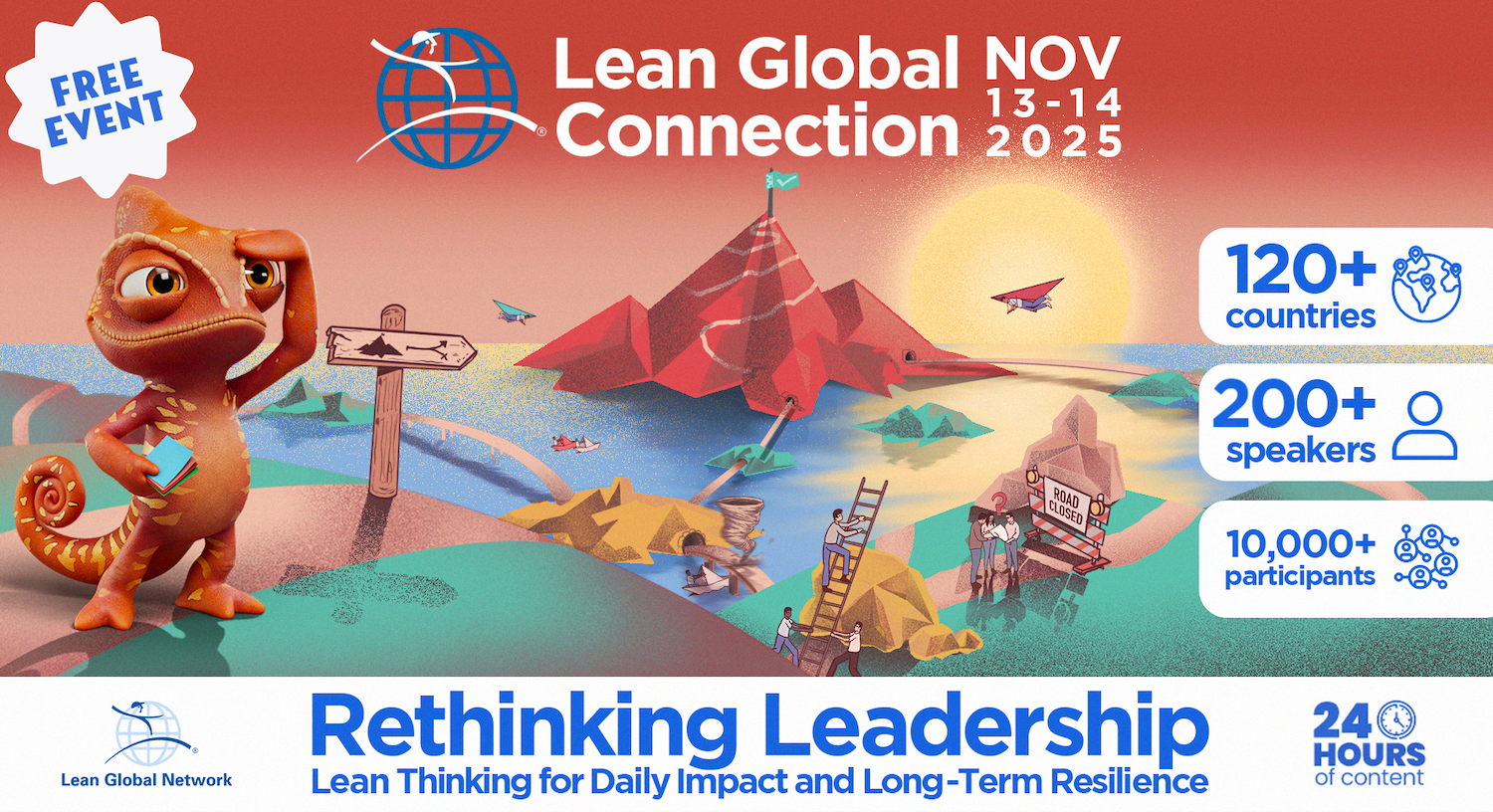
Leading with Lean at EHA Clinics
INTERVIEW – In this Q&A, the CEO of EHA Clinics in Nigeria shows how leadership embraced continuous improvement, empowered staff, and shifted from firefighting to coaching, creating safer, more efficient patient-centered care.
Interviewee: Dr. Ifunanya Ilodibe
Roberto Priolo: We have talked about the EHA Clinics' lean initiative here on Planet Lean before. Can you refresh our memories and tell us very briefly about it? What's its scope and aim?
Dr. Ifunanya Ilodibe: At EHA Clinics, we have embraced Lean as a way of saying, as a way of saying, “Good is not enough.” We’ve always cared deeply about quality and patient safety, but we also knew that to keep improving, we needed more than good intentions—we needed a framework that would challenge us to do better every day. That’s really what Lean Thinking represents for us: a shift towards a continuous improvement mindset.
The scope is broad. It touches everything, from clinical care to administration, and even how we onboard new staff. We started small, with 5S and A3 Thinking, but very quickly it became clear that this wasn’t just a project. It was about building a culture where everyone, from our front-line staff to leadership, sees themselves as problem solvers.
The aim has always been simple but ambitious: to close the gap between people and high-quality care. Whether it’s reducing patient wait times, improving our incident management system, or embedding Lean into our strategy and daily huddles, the goal is the same: safer, better, more efficient care for every patient, every time.
RP: What is the role of leadership within the lean transformation of EHA Clinics?
II: In my experience, Lean is one of those things that is driven from the top. Of course, it teaches us to get everybody involved, including frontline staff—and that’s critically important—but it is leadership who drives the tone. If leaders do not believe in it, it will never work. In Lean, you must lead by example, showing up at the gemba and living and breathing the principles. It’s the only way to achieve a cultural transformation.
RP: How does EHA leadership strike a balance between solving the problems that occur day after day and sticking to the organization's long-term strategy?
II: This is an interesting question. I think, first of all, in the way we think of strategy at EHA Clinics, our True North. Our key objectives are quality and safety, of course, and that means that we think about everything through those lenses. This keeps us grounded and our decision-making centered.
EHA Clinics is a business. Things happen daily, and problems will occur, but we always try to keep our True North in scope. When trying to solve a problem, how do we ensure that it does not recur so that it does not distract us from the actual long-term strategy? I think that's what Lean does. When you use lean tools, you find the root cause of problems, start coming up with lasting solutions, and create learnings. If you have done a proper root cause analysis and addressed the root cause effectively, then there is a good chance the problem will not recur. Even if it does recur, people will take from the learnings to handle them effectively. This minimizes distraction.
The goal is not to fire-fight every problem every day. Lean actually allows us to keep our eye on our True North because when we solve problems at the root cause, we are not spending our days in constant firefighter mode. And guess what? Because the team members are empowered to solve problems, a lot of problems don't distract from the strategy.
RP: In your mind, what makes lean leadership unique?
II: For me, it is the fact that traditional leaders are expected to know the answers to everything and always have solutions. Everybody goes to them when a problem appears. With lean leadership, I don't need to be the “superhero” problem solver, doing it all by myself; instead, I'm a coach, teaching others how to solve problems. If you're the kind of leader who loves everybody coming to ask you for solutions to problems, you won't like Lean. Because with this methodology, you empower others to address issues and don’t spend as much time on them as you would in a traditional organization.
Another unique thing about lean leadership is that it keeps you humble. You understand that the solution can come from anywhere and anyone. You understand that the fact you have designed a process does not mean it is perfect. In fact, when you develop a lean mindset, you go into every process you create with humility, knowing that you may be completely wrong and that the people who are actually operating within that process will provide feedback to you and flag up any problems they see. And when you see something that isn’t working—even if it’s something you have made—it is your role as a leader to improve it or altogether pivot.
RP: What's the strongest argument for lean leadership? Why should other leaders embrace it?
II: If you have a superhero complex, you can’t do Lean. I think in the interest of sustainability and scalability, a leader can't be the single source of truth. If you are in a business that you intend to scale and you want the organization to outlive your leadership, you need to be able to multiply improvement throughout the system. And that entails empowering people across the organization and developing their capabilities so they become autonomous in their problem-solving efforts.
RP: What is the hardest thing about changing the way one thinks as a leader?
II: As humans, we tend to live by the saying, “If it ain't broke, don't fix it.” However, it is imperative to remember that one of the few things in this life that are certain, like rain or taxes, is change. Things will change, and sometimes this is hard to deal with as a leader, especially when you have to accept that something you (co-)created—whether a system, a process, or a product—no longer serves. What worked in the past is not guaranteed to work in the future, and when that happens, we as leaders need to leave the ego behind and act swiftly. Indeed, I believe the hardest thing is moving away from what has worked in the past to embrace new realities and new ways of doing things.
RP: Anything else you’d like to add?
II: Lean has been transformative for me—not just as a leader, but also as a person. Embracing the idea that things can be continuously improved has made me a better spouse and parent. These days, I tend to see challenges as opportunities, not roadblocks. Lean has made me inquisitive, teaching me to question the world around me and ask “why?” in situations that traditionally I would have just accepted.
Of course, it has radically changed my mindset as a leader. In my mind, leaders had always been the ones with the power and with all the answers. Today, I tell my team that I plan to become the ‘most useless’ team member, because I want to empower them so much that they don't need me anymore. If I come to work for a week and nobody comes to ask me any questions, I feel like I have achieved something. This is not how I would have thought of leadership five years ago, so it is certainly a humbling place to be. The key for me is understanding that you may not always have the answer, and that the only way you can grow is to ensure that other people have it.

Dr. Ifunanya Ilodibe will present at this year's Lean Global Connection. If you haven't already, register for free here.
THE INTERVIEWEE

Read more


FEATURE – When the number of Covid-19 cases skyrocketed in the Italian region of Piedmont, this microbiology lab had to find a way to increase its capacity to process swab tests. Here’s how they did it.


INTERVIEW – Earlier this month, we attended a Lean Day at Dreamplace Hotels and Resorts in the Canary Islands. We sat down with two lean leaders to discuss the transformations of their businesses.


FEATURE – Lean thinking has helped this dental practice in Italy to streamline the work, develop the capabilities of workers and free up a lot of the head dentist’s time.


WOMACK'S YOKOTEN – As a new age in aerospace dawns, with a need to move from huge and bespoke designs to affordable and high-volume production, lean thinking has a key role to play. But will the industry listen?
Read more


FEATURE – Thanks to Lean, EHA Clinics improved safety, efficiency, and patient experience. Now they’re hoping their results will inspire a growing movement to transform healthcare across Nigeria.


CASE STUDY – Lean Thinking travels far and wide. Here’s how the experience and insights of an Indiana-based farmer have supported a USAID project to improve outcomes for farmers across Nigeria.


FEATURE – At Malamulele Onward in Johannesburg, a do-it-yourself lean transformation is increasing the impact the nonprofit organization is having on South African children living with cerebral palsy.


FEATURE – Only when we go where the action is, do we begin to truly understand the work. Rose Heathcote joins the Emergency Medical Services in Cape Town for a day.

